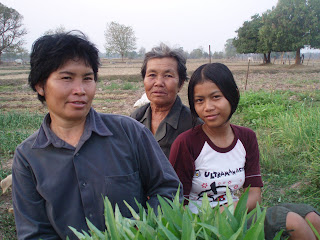At home, an industrial farmer might grow potatoes in Idaho in soil ravaged by chemical fertilizers, harvest them by machine, ship them to a distributor where they are packaged and sent to my local supermarket, where I might pick up a bag to take home to my house. A long chain of events separates the production and consumption of my food. Days, weeks and many middle men lie between the harvest of my potatoes and me eating them. I am not proud to say that I am thoroughly disconnected from the food I eat.
This all changed, however, when I went on my Rural Agriculture Unit homestay. We were all placed with small scale farmers who practiced organic agriculture. My family grew corn, tomatoes, chives, squash, herbs and purple sweet potatoes. Almost everything my homestay partner (Cortney) and I ate came from farm we lived on. I’ve had plenty of experience on what it is to be a consumer, but now I had the opportunity to learn a little about being a producer.
Laughter and smiles surrounded me and Cortney as we were handed hoes and directed to a bed of vegetables. After a brief demonstration, we “dug” right into our task of unearthing purple sweet potatoes. We had been put to work, and our family could not have found more enthusiastic helpers. Our enthusiasm proved to be a bit unrefined, however, as we tended to chop in half many of the potatoes we were digging up. The response to our blunders? More laughter.
The next day we sold those very same purple sweet potatoes at the Saturday Green Market. It was strange to stand behind my homestay mom, looking at those potatoes on display for sale. It had been less than 24 hours ago that I had seen them emerge from the earth like buried treasure.
It would have been easy for an outsider to look at this process and see a traditional way of farming that hasn’t changed in years. I know better that the globalization of agriculture has drastically affected the lives of my family, as well as every other farmer in Thailand.
Most Thai farmers switched to chemical farming during the Green Revolution, enticed by lures of higher yields and higher profits. Previously sustainable villages sold their crops away from their homes, and bought the food they ate from outside the town. This created a flow of capital away from the village to larger corporations, instead of keeping food local and sustainable. Many were put into debt, as they invested in monocropping and more and more chemical fertilizers. This created even more pressure to raise profits to pay off their loans.
It was the detrimental health effects of chemicals and the collapse of the traditional village way of life that has spurred a local organic agriculture movement. Many farmers were uneducated in how to safely use their new fertilizers, and health problems proliferated. My homestay mom had to go to the doctor many times before they switched to organic farming. With no local production and consumption of food, communities are less sustainable. Many villages have also experienced a decrease in biodiversity, as most farmers move towards planting engineered seeds promising high yields. Local varieties rice and corn are lost.
The decision to return to sustainable agriculture is not an easy one. Many are worried that they won’t make as much money, and be farther in debt than before. In fact, after a few years, organic farming is more profitable than chemical farming. My own family made the switch 7 years ago and is now debt (and health problem) free.
Evelyn Holt - Wake Forest University





